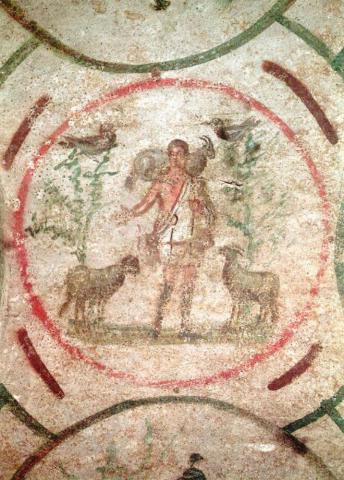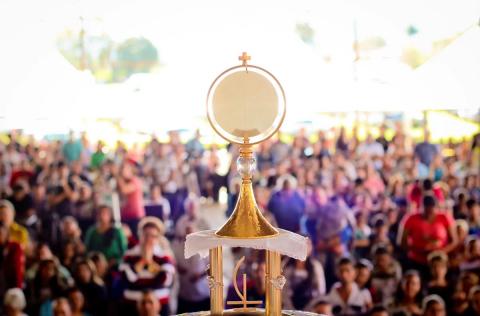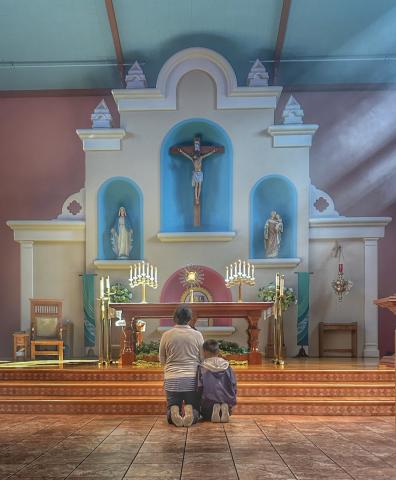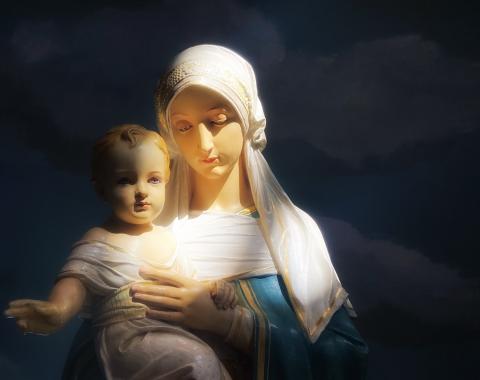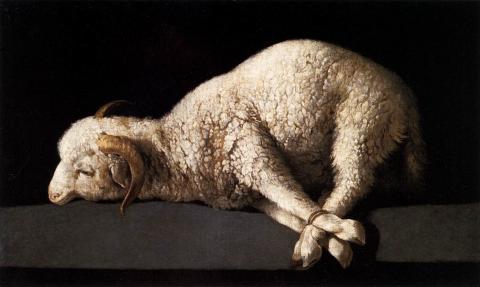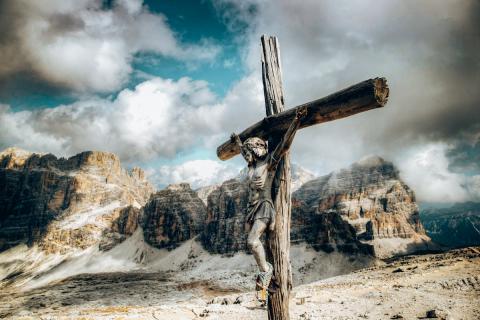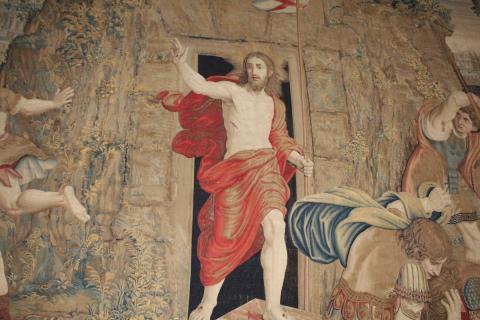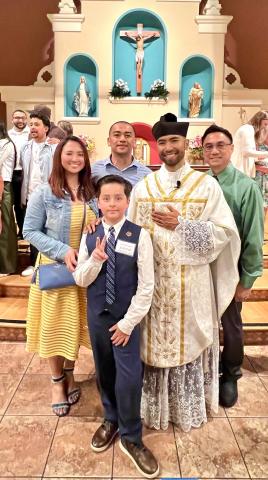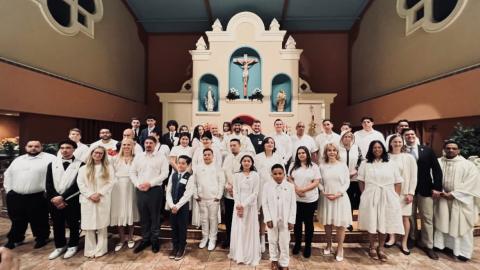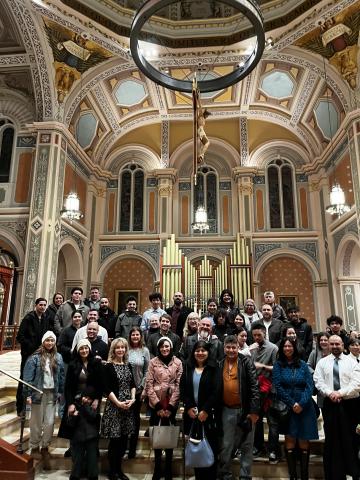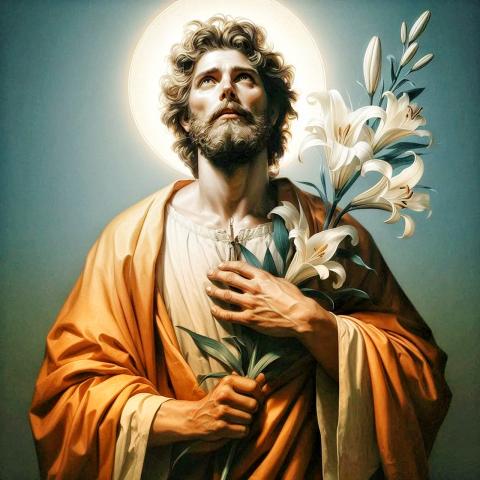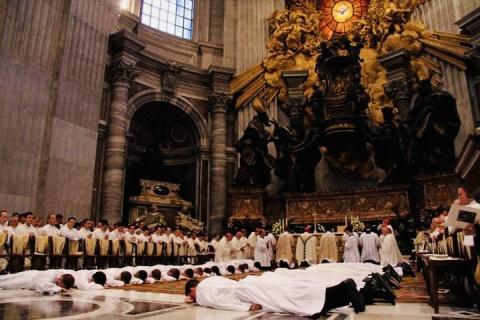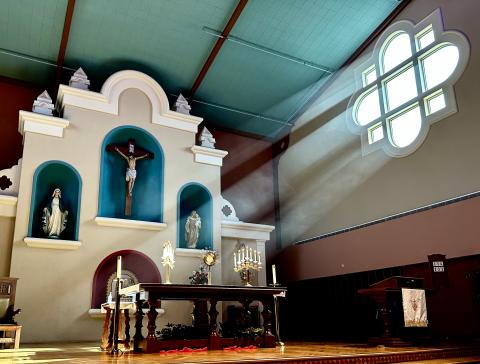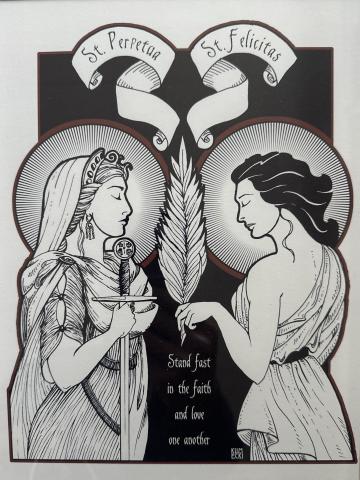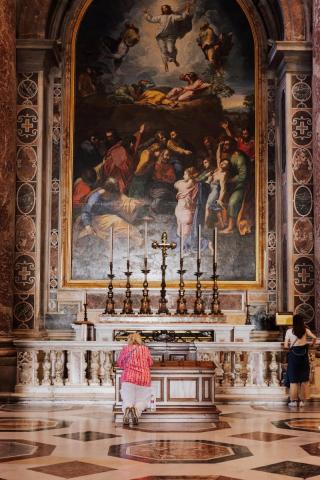Discover Fr. Brian Soliven Sunday Sermons
Fr. Brian Soliven Sunday Sermons

412 Episodes
Reverse
On the front cover of our amazing church bulletin is the oldest surviving painting of Jesus as the Good Shepherd. The 3rd century art is found in the dark labyrinth of tunnels that run for miles beneath the city of ancient Rome, where our early Christian ancestors buried their loved ones. It shows Jesus as a young man, surrounded by three goats. He carries one on his shoulders as he feeds the other two. It’s not by accident the family chose precisely this scene to paint on the tomb of their beloved dead. Death is terrifying, confusing, confounding, and utterly heart-wrenching. As hard as we try to prolong our life and wish this pain were not so, the breath-stopping reality eventually arrives, always sooner than expected. This is why we need Jesus Christ. The world needs the Good News of the Church, boldly proclaimed and lived.
Our precious Lord tells us in this Sunday’s Gospel passage, “I am the Good Shepherd. A good shepherd lays down his life for his sheep…. I am the good shepherd, and I know mine and mine know me…” (cf. John 10:11-18). If indeed this is true, that Jesus is the shepherd, then we must follow him. The Christian is happily one of these goats that listens to the voice of Jesus Christ. One of the hardest parts of being a goat is trusting in the shepherd's voice when he leads us to places we do not want to go. Christianity is a total reorienting of one's moral life. We can longer behave like the rest of the world who do not believe. The faithful goat follows wholeheartedly the commandments of God, most especially in the challenging aspects of the Church’s teachings. A recent convert to the Church once said that one proof that shows him the Catholic Church is the true church established by Christ, is our stance on sexual morality. If the Church changes her teachings to conform to today’s modern everchanging view of human sexuality, she has stopped listening to the voice of the shepherd. If the Church holds firm, it reinforces the Church’s divine origin.
Every departure from Christ's teachings is ultimately rooted in mistrust. Every time I sin, I choose not to follow because I believe my happiness will be found in doing my own will. It’s the same rational Adam and Eve used when they ate of the fruit of good and evil (cf. Genesis 2:17). But we all know this road never leads to the deeper peace and joy we all search for. I dare say, only in following the Good Shepherd will we finally find true fulfillment. But to reach this nourishing pasture, we must first trust Jesus Christ. After all, he has proved his goodness to us in the most radical and beautiful way, has he not? “I will lay down my life for the sheep,” he tells us (cf. John 10:18). Jesus dies for you and I. If he’s willing to do that, why should I doubt his plan for me?
With today's Gospel passage, we now come to the end of the controversial John 6, where our Lord teachings about his True Presence in the Eucharist. It's the deal breaker for many of his followers. They simply cannot accept that his "flesh is true food and his blood is true drink." Luckily, St. Peter speaks on behalf of us all, who simply desire to follow Jesus, no matter how strange his teachings.
Once you recognize Jesus in the Holy Eucharist, your Christian life will never be the same again.
What makes for true beauty? We easily spend effort and time to make our bodies look beautiful, but what about our souls?
If your basketball fan, the perennial back and forth argument is, "Who is the greatest player ever?" Is it Michael Jordan, Lebron James, Kobe Bryant or someone else. Regardless of who you choose, the quality that makes them great parallels what makes an amazing saint.
In our Second Reading today, John uses a very specific word to refer to what the death of Jesus did, "expiation." The original greek word is "hilasmos," which is direct reference to the Day of Atonement, the holiest day of the Jewish calendar. When we understand this theological background, the full implication of Christ's sacrifice takes on new meaning.
Our losing fight against aging is proof we need the Resurrection.
Christ is Risen! This single event, proclaimed in the face of death and torture, changes the world as we know it. Live it.
The Resurrection of Jesus Christ changes everything. Upon this one single doctrine of our Christian religion, the entire 2,000 year old edifice of the Catholic Church is built. If Jesus is still dead, then St. Paul is absolutely correct: “ if Christ has not been raised, then our preaching is in vain, your faith also is in vain.” (Cf. 1 Corinthians 15:14). We should all go home. However, we proclaim the tomb is empty! He lives, just as our Lord promised us he would. That means we are no longer enslaved to death and sin. This Sunday, now known as Divine Mercy Sunday, we encounter the unfathomable greatness of God. There is no sin so heinous, so foul, for God to turn his face away from us.
A life lived in Christ, is the truest of lives. Without him, we are slaves to the whims and changes of our circumstances. Without him my value depends on the approval and affirmation of others. Without him, death itself will devour me, no matter how much vegetables I eat. Not anymore! The resurrected Jesus changes everything. If Jesus is alive as we Christians joyfully affirm, it means that Jesus is truly who he claimed to be – God in the flesh. The words he told Martha in the Gospel of John during the infamous account of the death of her brother Lazarus, can suddenly takes on new power: “Jesus said to her, ‘I am the resurrection and the life. He who believes in Me, though he may die, he shall live. And whoever lives and believes in Me shall never die. Do you believe this?’ She said to Him, ‘Yes, Lord, I believe that You are the Christ, the Son of God, who is to come into the world.’” (Cf. John 11:25-27).
And now I ask you, my dear Christian, the same Christian asked Martha, “Do you believe this?” Do you? Do you believe that Jesus Christ is the Son of God? Do you believe that he has been raised from the dead? Do you believe that he has opened the gates of Heaven for us through the pouring of his precious blood upon the cross? Do you believe that we shall join him in Heaven, as long as we stay faithful to his commandments, even if the world mocks us for our love? How we answer these critical questions will change how we live Easter Sunday.
Ha comenzado. Ha llegado el tramo más solemne de la cristiandad: la Semana Santa. Toda la vida humana de Jesucristo en la tierra, los treinta y tres años, culminarán esta semana. Preste atención a las lecturas. Asista a todas las liturgias que pueda, desde el Jueves Santo, Viernes Santo y finalmente el Domingo de Resurrección. El drama de nuestra salvación se desarrollará ante nuestros propios ojos. Para entender más profundamente esta semana solemne, mantenga el libro de Génesis en mente. Debemos recordar cómo comenzó el error del pecado. En Génesis capítulo tres, vemos la caída de la humanidad con el Pecado Original a través de la tentación de ese maldito fruto: “La serpiente era el más astuto de todos los animales del campo que Yavé Dios había hecho. Dijo a la mujer: «¿Es cierto que Dios les ha dicho: No coman de ninguno de los árboles del jardín? » (Cf. Génesis 3, 1). La serpiente es Lucifer, el ángel caído. Se rebeló contra Dios poco después de haber sido creado debido a su orgullo idiota. Pensó que podía vivir sin Dios.
Ahora pone su mira en corromper la creación más valiosa de Dios: la humanidad. “"Y como viese la mujer que el árbol era bueno para comer, apetecible a la vista y excelente para lograr sabiduría, tomó de su fruto y comió, y dio también a su marido, que igualmente comió." (Gene sis 3:6)A partir de este momento, el pecado y la muerte se precipitan en el mundo como el agua que brota de un dique roto. Nuestro corazón, que fue creado para la relación con Dios (Gensis 1:27) se desvía. Ahora tratamos de reemplazar el amor de Dios con los mismos amores falsos y aburridos: riqueza, placer, poder y honor. Estos cuatro clásicos amores falsos siempre nos fallarán. Nunca pueden entregar la felicidad duradera que deseamos. Sin embargo, todavía los elegimos una y otra vez. El famoso autor inglés y convertido al cristianismo articuló perfectamente este fenómeno cuando dijo: “La historia humana es la larga y terrible historia del hombre tratando de encontrar algo que no sea Dios para que lo haga feliz”.
¿Cómo nos puede recuperar Dios? Esta es la pregunta definitiva. Si fueras Dios, ¿cómo recuperarías a la humanidad? Tu mayor problema sería la voluntad libre. No puede obligarnos a amar a Dios, de lo contrario, nos quitaría la capacidad de elegir. El amor por su propia definición necesita ser una elección libre. Entre la genialidad y la belleza de la Semana Santa. La misión de rescate de Dios estará en plena exhibición de la manera más inesperada. Este Domingo de Ramos, las grandes multitudes darán la bienvenida a Jesús como un rey conquistador. Piensan que vendrá como los mismos tiranos de la historia humana que piensan que el poder y el poderío militar significan victoria. Por eso el pueblo recibe a Jesús con las palmas como manda la antigua costumbre. “¡Matará a nuestros enemigos y reconstruirá el reino judío!” Pensaron mal. Querían más riqueza, placer, poder y honor. Pero Jesús no está aquí para eso. Entra en Jerusalén para conquistar algo mucho más precioso: a nosotros. Lo hará, no a través de la espada, sino con su sangre. La misma multitud que vitoreaba a Jesús con las ramas de Palma, de repente tomará un giro más oscuro, más siniestro. En lugar de “hosanna”, estas mismas voces ahora cantarán, “¡CRUCIFICALO! ¡CRUCIFICALO!” Su muerte en la cruz gloriosa será el mayor acto de amor que la humanidad jamás encontrará. Mis amigos, prepárense para la Semana Santa.
It has begun. The most solemn days of Christianity has arrived – Holy Week. The entire human life of Jesus Christ on earth, all thirty-three years, will culminate this week. Pay close attention to the readings. Attend all of the liturgies as you can, from Holy Thursday, Good Friday and finally Easter Sunday. The drama of our salvation will unfold before our very eyes. To understand this solemn week more deeply, keep the book of Genesis in the background. We must remember how the mess of sin first started. In Genesis chapter three, we see the fall of humanity with Original Sin through temptation of that darn piece of fruit: “Now the serpent was more crafty than any of the wild animals the Lord God had made. He said to the woman, “Did God really say, ‘You must not eat from any tree in the garden’?” (Cf. Genesis 3:1). The serpent is the fallen angel Lucifer. He rebelled against God shortly after he was created because of his idiotic pride. He thought he could live without God.
Now he sets his sights on corrupting God’s most valuable creation – humanity. “When the woman saw that the fruit of the tree was good for food and pleasing to the eye, and also desirable for gaining wisdom, she took some and ate it. She also gave some to her husband, who was with her, and he ate it.” From this point on sin and death rushes into the world like water bursting through a broken dam. Our heart which was created for relationship with God (Cf. Genesis 1:27) goes astray. We now try to replace the love of God with the same, boring, counterfeit loves: wealth, pleasure, power, and honor. These classic four false loves will always fail us. They can never deliver the lasting happiness we desperately desire. Yet, we still chose them over and over again. The famous English author and convert to Christianity, C.S. Lewis, said it best: “Human history is the long terrible story of man trying to find something other than God which will make him happy.”
How can God get us back? This is the ultimate question. If you were God, how would you win humanity back? Your biggest problem would be free will. You cannot force us to love God, otherwise, you remove our ability to choose. Love by its very definition needs to be a free choice. Enter the genius and beauty of Holy Week. God’s rescue mission will be on full display in the most unexpected of ways. This Palm Sunday, the huge crowds will welcome Jesus as a conquering king. They think he will come like the same, tired, tyrants of human history that think power and military might means victory. That is why the people greet Jesus with the palm branches as the ancient custom demands. “He will slaughter our enemies and rebuild the Jewish kingdom!” They thought wrongly. You see they wanted more wealth, pleasure, power, and honor. But Jesus is not here for that. He enters Jerusalem to conquer something much more precious – us. He will do it, not through the sword, but with his blood. The same crowd that cheered Jesus with the Palm branches will suddenly take a darker, more sinister turn. Instead of “hosanna,” these same voices will now chant, “CRUCIFY HIM! CRUCIFY HIM!” His death upon the glorious cross will be the greatest act of love humanity will ever encounter. My friends, get ready for Holy Week.
We are so much more than what we've been told. I am not an upright monkey with an iPhone. I am not my sins. I am not merely a consumer of things. Our identity, revealed to us in Christ, shows us who we truly are.
How do we respond to the crisis' of our lives? We all know they will hit us eventually, like the next coming ocean wave. Today, as the Church celebrates the Solemnity of St. Joseph, we can find inspiration in his example. In Scripture, we always find Joseph facing a trial. His betrothed wife is pregnant. Herod wants to kill his newborn son. Jesus is lost in the Temple in Jerusalem. Crisis abounds. His reaction shows us how we are to act when smacked in the face by life.
At the end of the day, we all want to be happy. It’s a universal truth that unites us all. The real dilemma is how to find this happiness and most of all, keep it. Oftentimes, this happy life feels like grasping a handful of sand; we feel it, we think we have a firm hold of it, but the harder we try to clench it, the faster it slips from our fingers, grain by grain. So we reach down again to grab yet more sand, only to have the frustrating cycle repeat over and over again. We never stop searching. Christianity, however, offers another mysterious, counterintuitive way forward. In the Gospel this Sunday, Jesus strangely says, “Amen, amen, I say to you (whenever Jesus begins with “Amen, amen,” he is signaling that what is about to come next is extremely important), unless a grain of wheat falls to the ground and dies, it remains just a grain of wheat; but if it dies, it produces much fruit. Whoever loves his life loses it, and whoever hates his life in this world will preserve it for eternal life.” (Cf. John 12:24-26). If we want to find and hold true, lasting happiness, Jesus tells us, we must stop looking for it. Rather, let go. Die to yourself. Seek me first.
We see this dynamic in the life of one of Christianity’s greatest, most well-beloved saints, St. Patrick. Born in 387 in what is now Great Britain, to Catholic parents. However, he was not particularly devoted to his faith as a young man. He referred to himself in regards to his faith as “idle and immature.” This is all changed when at 16 years old, he is captured by Irish pirates during a raid. He was then taken back to Ireland as a slave for the next six years. From the outside perspective, Patrick should be utterly miserable. There is no semblance of happiness. Here is Patrick, utterly alone in a foreign land, where he does not speak the language, enslaved, and his parents are an ocean away. No one would ever willingly choose his situation. However, remember the words of Jesus Christ, “unless a grain of wheat falls to the ground and dies, it remains just a grain of wheat; but if it dies, it produces much fruit.” In his suffering, God was there.
As he worked in the field in that strange land, the Catholic faith of his youth suddenly began to catch fire. He realized he needed God for the first time. He repented and begged for the forgiveness of sins. He put to death his selfish desires and made a decisive decision to live for Jesus Christ from that moment on. He would enter the seminary shortly after his escape from slavery and return to the people who once enslaved him. But because God’s providence is never lacking, Patrick learned the Gaelic language of Ireland and proclaimed the Good News of Jesus Christ in their own tongue. Within a generation, Patrick would convert that entire Island to Catholicism. For the next 1500 years, Ireland would be a spiritual powerhouse, sending missionaries across the world. All of this happened because one young man “died” like a grain of wheat. You and I must do the same. Then we will find that lasting happiness we’ve been desperately searching for.
Love forces us to be vulnerable. It requires me to open myself to you and put my life in your hands. Jesus does this by dwelling among us. Even more, he does this at every single Holy Mass.
A few days ago, I went to Elk Grove, the town I grew up in. When my family moved there in 1990, it was considered a small rural, farming community, much how Vacaville used to be. The population was a mere 17,000. Today, it has ballooned to 180,000. I wish I went there for a happier occasion, but sadly, I returned to preside over a funeral of an old friend I had known since the 6th grade. We lost touch after we graduated high school, as relationships tend to do when we move into adulthood. His passing made me reflect on how short life truly is. It's frustratingly fragile. Funerals forces us to confront the hardships of our existence that we normally try to ignore.
The 17th century, famous French philosopher and mathematician, Blaise Pascal, poignantly said, “All of humanity's problems stem from man’s inability to sit quietly in a room alone.” When we sit in solitude and silence, you’ll begin to notice the clanging restlessness that rages within each and every one of us. Silence forces us to confront our inner demons and pain of our lives. We all develop different ways of coping, whether that’s eating, buying more stuff, or the million of other myriad of ways we distract ourselves.
Jesus shows us a better way.
The oldest of the prayers used at the Holy Mass is called the Roman Canon. It's marked by a list of strange names that the early Christians wanted to remember. When we learn their stories, it's no surprise why.
As the Season of Lent marches on, pay attention to the Scripture Readings at Mass. The drama is intensifying. In the Gospel passage, we find Jesus in the Temple area in the famous scene with the Lord, confronting the “money changers seated there.” Oftentimes when we think of Jesus, we see as meek, humble and kind, which he is. However, so few people imagine this Jesus in the Gospel. He is furious. Angry. In some ways, he is violent. He flips the tables of these money changers and chases them out. In John’s account of this incident, he points out that Jesus even made a whip out of cords and used it to scare them off. From this moment on, the Jewish leaders had enough. They will set in motion a dastardly plot to have Jesus murdered. How can we reconcile this temperament of Jesus with the one that is commonly shared by so many? We must first understand who God is. Remember, God is love. He loves us with an unimaginable passion. Love by definition, hates anything that hurts the beloved. Whatever hurts us, God despises, just as a parent hate that which causes their child pain. Sin destroys us from within. Our Heavenly Father sends his Son Jesus to rectify this sorry condition. The whole point of the Holy Temple in Jerusalem was to bring humanity back into relationship with God but the money changers had instead turned it into “a den of thieves.” It became a place of profit and greed, rather than an encounter with divine love. Christ sees this, and comes to set things right.
To unlock the power of Lent, we need one thing—love. Love gives us the superpower to peer beyond the mere superficial. Take the prime example of bride and groom on their wedding day. Notice how they look at one another. As stunning as the flowing dresses may be or dapperly the suits, the real drama takes place on their faces. Their eyes are locked on each other in immortal affection. The miniscule muscles around the mouth tremble loftily. The rest of the body freezes in warmth, as the heart palpitates blood a thousand times over. Bride and groom stand before one another, face to face, dazed by mystery. Staring at one another at the colossal of moments, they see something entirely different then you and I. We see our friends, our sister or brother, our daughter or son, our cousin of distant relation or whatever the connection may be. The groom and bride however, recognize that the one who stands before them is so much more. Love has the power to penetrate the surface of reality, manifesting another entirely sweet dimension.
“Who do you say that I am?” Jesus asked this question to his disciples in Matthew 16:13-16. Or put it another way, he asked them what do you see when you look at me? Other people answered sheepishly: “Some say John the Baptist, others Elijah; and still others say Jeremiah or one of the prophets.” This anemic answer is stuck on the surface. But notice the response of Peter in this pivotal flash. Through a unique gift of grace, God granted him the transformative vision of love. He exclaimed, “You are the Messiah, the Son of the living God.” Peter went deep, blazing past the mere appearance of Jesus as he stood there in all his normalcy and saw the hidden divine truth—the man in front of him was more than a man. Just like a bride on her special day, the man standing before her is more than a man, and she is more than just a woman to him.
With all that said, what do you see when you stare at the Eucharist? Through all appearances, your senses tell you one thing. The eyes see bread and your palette tells you the same. The wine still tastes and smells like fermented grapes. Yet, the words of Jesus in the infamous Gospel of John, chapter six, haunts us, methodically and scandalously. “This is hard; who can accept it?” they said, when Jesus commanded them that his “flesh is true food and his blood his true drink.” If they want eternal life, they must gnaw on him. This was simply too much for many of those who followed Jesus. The majority of the people abandoned him here. They “saw” Jesus and balked. Turning to the remaining few who lingered, he asked them the question that love dreads to ask, “Do you also want to leave?” For love to be authentic love, it must be given freely and accepted without coercion or force. Jesus gives them the option to stay or flee, to return to life as the status quo and go back to the surface. Peter now, with eyes enraptured in love replies, “Master, to whom shall we go? You have the words of eternal life, we have come to believe and are convinced that you are the Holy One of God.” Peter saw love. Peter saw Jesus in the Eucharist. The saints see Jesus giving every ounce of his love to go after the lost sheep. What do you see?


